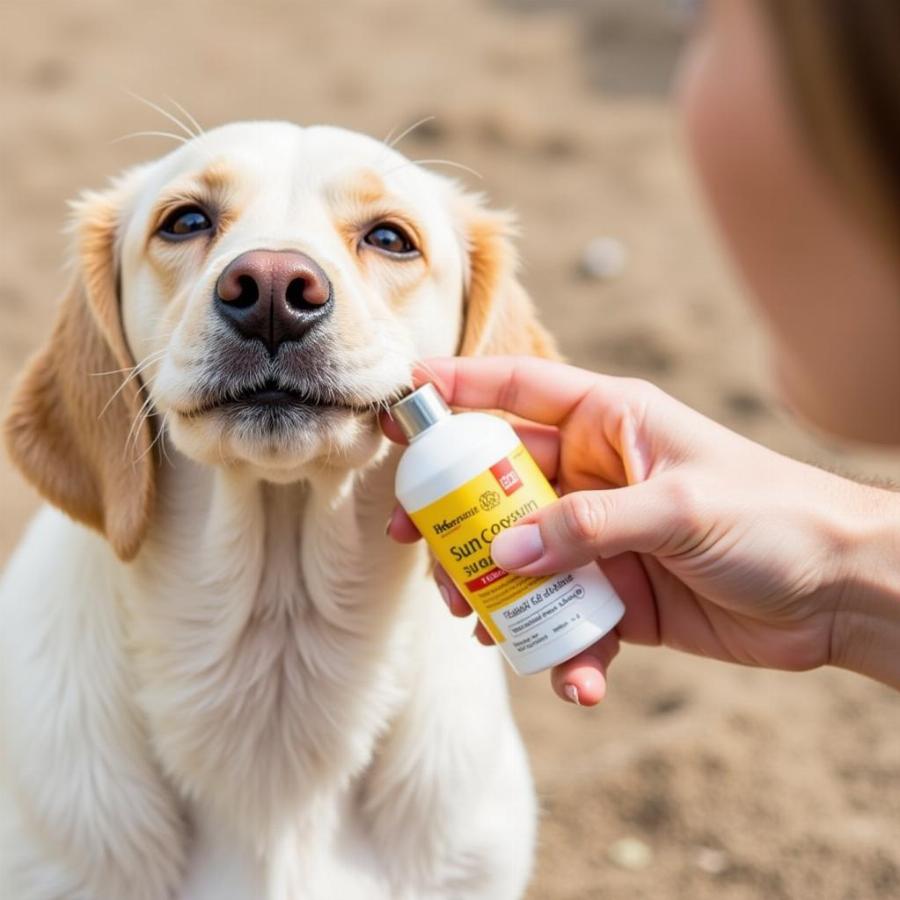Have you noticed white spots on your dog’s nose? While often harmless, these spots can sometimes signal underlying health issues. This comprehensive guide will delve into the common causes of white spots on a dog’s nose, when to seek veterinary care, and how to keep your furry friend’s nose healthy.
Understanding Dog Nose Pigmentation
A dog’s nose derives its color from melanin, the same pigment responsible for skin and hair color. Just like humans, dogs can experience changes in pigmentation throughout their lives. These changes are usually benign, but it’s essential to differentiate between typical variations and potential health concerns.
Common Causes of White Spots on a Dog’s Nose
1. Winter Nose or Snow Nose (Hypopigmentation)
One of the most frequent causes of white spots on a dog’s nose is winter nose, also known as snow nose or hypopigmentation. This condition causes the nose to lighten, often appearing pink or white, during colder months. The exact cause is unknown, but it’s believed to be related to reduced enzyme activity in colder temperatures, affecting melanin production.
Is Winter Nose a Concern?
Winter nose is generally harmless and temporary. The nose typically returns to its normal color during warmer months.
2. Vitiligo
Vitiligo is a rare skin condition that causes a loss of pigmentation, resulting in white patches on the skin, including the nose. While the exact cause is unknown, vitiligo is believed to be an autoimmune disorder where the body attacks its own pigment-producing cells.
Is Vitiligo a Concern?
Vitiligo itself is not life-threatening. However, if you notice depigmentation on your dog’s nose or other body parts, consult your veterinarian to rule out other conditions.
3. Allergies
Just like humans, dogs can suffer from allergies. Some dogs may develop skin allergies that manifest as white spots or patches on the nose. Common allergens include certain foods, pollen, dust mites, and mold.
Are Allergies a Concern?
Allergies can cause discomfort and, if left untreated, lead to secondary infections. If you suspect your dog has allergies, it’s crucial to identify and manage the triggers.
4. Injury or Scarring
Trauma to the nose, such as a scrape, cut, or burn, can damage the pigment-producing cells, leading to white spots or scars.
Is an Injury a Concern?
Minor injuries usually heal on their own. However, deeper wounds may require veterinary attention to prevent infection and ensure proper healing.
5. Other Potential Causes
While less common, white spots on a dog’s nose can also be associated with:
- Autoimmune diseases: Certain autoimmune diseases can affect pigmentation.
- Fungal or bacterial infections: Skin infections can sometimes cause changes in skin color.
- Cancer: In rare cases, skin cancer can present as white spots or growths on the nose.
When to Seek Veterinary Care
While most instances of white spots on a dog’s nose are benign, it’s always best to err on the side of caution. Consult your veterinarian if you notice:
- Sudden appearance of white spots or changes in pigmentation
- Spreading or changing shape of white spots
- Redness, swelling, discharge, or odor around the white spots
- Signs of discomfort, such as itching, rubbing, or pawing at the nose
Keeping Your Dog’s Nose Healthy
A healthy nose is crucial for a dog’s well-being. Here are some tips to keep your furry friend’s nose in top shape:
- Regularly check your dog’s nose: Look for any changes in color, texture, or discharge.
- Protect your dog’s nose from the sun: Use a pet-safe sunscreen on the nose, especially for dogs with pink or light-colored noses, which are more susceptible to sunburn.
- Keep your dog hydrated: Provide fresh water at all times.
- Provide a balanced diet: A healthy diet supports overall skin and coat health.
Frequently Asked Questions About White Spots on Dogs’ Noses
Q: Can a dog’s nose change color with age?
A: Yes, it’s normal for a dog’s nose to gradually lose some pigmentation as they age, similar to humans developing gray hair.
Q: Are certain breeds more prone to white spots on the nose?
A: Yes, breeds with pink or light-colored noses, such as Dalmatians, Bulldogs, and Poodles, are more susceptible to hypopigmentation and sunburn.
Q: Can I use human sunscreen on my dog’s nose?
A: No, human sunscreens often contain ingredients that can be toxic to dogs if ingested. Use only pet-safe sunscreens.
 Applying Sunscreen to a Dog's Nose
Applying Sunscreen to a Dog's Nose
Need More Advice?
Beaut Dogs is your trusted source for all things dog-related! We’re passionate about providing dog owners with reliable and insightful information to help you provide the best possible care for your canine companions. For personalized advice and answers to your specific concerns, please don’t hesitate to contact us at [email protected].